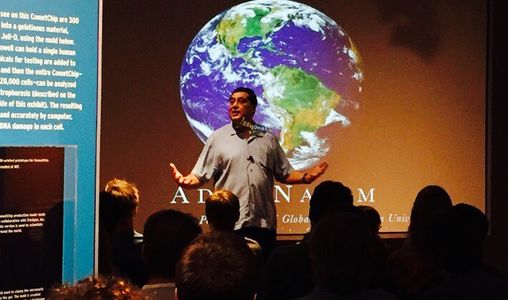Najam Speaks at MIT Museum on the Science and SciFi of Water Wars
Using two popular science fiction films – Mad Max: Fury Road (2015) and Day After Tomorrow (2004) – Adil Najam, Dean of the Frederick S. Pardee School of Global Studies and Boston University, said that Hollywood seems to understand the importance of water issues, but not how that will manifest itself in a future defined by global climate change.
As an example, he showed a clip from Day After Tomorrow where an avalanche of water is shooting down the streets of New York and the frightened protagonist of the plot rushes into a building and dramatically shuts the door on the raging water. “Yes, we need to shut the door on climate change!” said Najam, half jokingly.
Dean Adil Najam was speaking at the MIT Museum’s “movie night” titled Living in the Future. The event brought together a group of scientists and asked each to choose a clip or two from a science fiction movie and then talk about their research as it related to the context of that clip. Najam’s talk was titled “Water Wars: Mad Max or Day After Tomorrow?” He focused on the context of water and climate change.
Najam argued that water is, indeed, the front-line issue in adaptation to climate change, but that well before cinematically dramatic catastrophes there will be – and already are – everyday local tragedies. He lamented that these tragedies of adaptation to climate change and the injustice inherent in them are made worse by a global neglect, even by those who care deeply about climate change issues. He gave examples from South Asia of the severity of these ‘water tragedies’.
